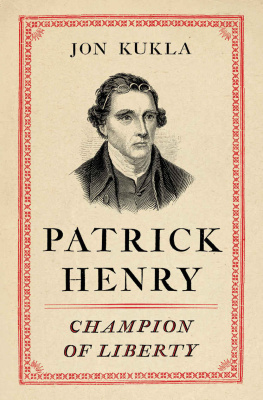
ALSO BY PATRICK COCKBURN
Muqtada al-Sadr and the Battle for the Future of Iraq
The Occupation: War and Resistance in Iraq
The Broken Boy
Out of the Ashes: The Resurrection of Saddam Hussein
(with Andrew Cockburn)
TIMELINE OF HENRYS
HOSPITAL STAYS
February 6, 2002: Henry is rescued from sea of Newhaven and taken to the hospital.
FebruaryApril 2002: The Priory Hospital.
AprilOctober 2002: Home in Canterbury.
OctoberDecember 2002: Henry returns to Brighton University and finishes the term.
JanuaryJune 2003: Anselm ward, St. Martins Hospital, Canterbury.
JuneAugust 2003: The Grove Rehabilitation Centre, Ramsgate.
September 2003: Anselm ward, St. Martins Hospital.
OctoberDecember 2003: Amber ward (unlocked, for less ill patients), St. Martins Hospital.
January 2004: Rehabilitation centre in Ethelbert Road, Canterbury.
February 2004 (very briefly): Amber ward, St. Martins Hospital.
FebruaryMay 2004: Anselm ward, St. Martins Hospital.
May 2004May 2006: Dudley Venables House or DVH (the secure ward), St. Martins Hospital.
May 2006January 2007: Bethlem Royal Hospital, Bromley, south London.
January 2007October 2009: Cygnet Hospital, Beckton, east London.
October 2009present: Cygnet Lodge, a step-down facility or halfway house, Lewisham, southeast London.
HENRYS
DEMONS

SCRIBNER
A Division of Simon & Schuster, Inc.
1230 Avenue of the Americas
New York, NY 10020
www.SimonandSchuster.com
Copyright 2011 by Patrick Cockburn and Henry Cockburn
All rights reserved, including the right to reproduce this book or portions thereof in any form whatsoever. For information address Scribner Subsidiary Rights Department, 1230 Avenue of the Americas, New York, NY 10020.
First Scribner hardcover edition February 2011
SCRIBNER and design are registered trademarks of The Gale Group, Inc., used under license
by Simon & Schuster, Inc., the publisher of this work.
For information about special discounts for bulk purchases, please contact Simon & Schuster
Special Sales at 1-866-506-1949 or business@simonandschuster.com.
The Simon & Schuster Speakers Bureau can bring authors to your live event.
For more information or to book an event contact the Simon & Schuster Speakers Bureau
at 1-866-248-3049 or visit our website at www.simonspeakers.com .
Manufactured in the United States of America
1 3 5 7 9 10 8 6 4 2
Library of Congress Control Number: 2010017760
ISBN 978-1-4391-5470-0
ISBN 978-1-4391-6035-0 (ebook)
FOR JAN AND ALEX
PREFACE
T his book is about how my son Henry was diagnosed with schizophrenia in 2002 and how this affected him and our family. As he started to recoverand this recovery is by no means completeabout three years ago, I began to think that he and I should write about our experiences. I felt that we might turn everything he had suffered into an asset. He was ideally placed to write from the inside about what it was like to have an acute mental illness in which trees and bushes spoke and voices called him to flee into the night or plunge into icy water where he might drown. He knew what it was like to live in mental hospitals, places that most people regard with ignorance and dread. I believed that Henry and I could serve a broader public purpose by making schizophrenia and mental illness in general less of a mystery which people are embarrassed to discuss. I began to think with growing enthusiasm about writing a book with Henry about what he, along with the rest of his family, had been through.
The more I considered it, the more I thought that what was really needed was a book that would be not only different from others but unique in its description of mental illness. It would definitely not be just a book with a joint byline, which in fact would be an account by me of Henrys ordeal, like the best-selling but ghostwritten memoirs of so many sportsmen, generals, and politicians. I believed this would not do, even if I faithfully tried to report everything which had happened to my son. The mental world in which he had been living was so different from my own that his firsthand testimony alone could convey what it is like to hear voices and see visions, to be tormented by waves of unexplained guilt and to lose all sense of the difference between what is imaginary and what is real. Only Henry himself could describe the landscape of this hidden planet on which he lived, along with so many others suffering from schizophrenia.
I ran my idea for the book past him, and he liked it, though when we spoke of his hallucinations, he objected to the word, since to him they remain genuine events. I thought the way he defended the reality of his experiences would be an advantage because, though people with mental disorders have written books, they commonly do so after they are largely recovered. This is not good enough; I know, having reported many wars, how difficult it is to recapture intense emotions like fear of death even seconds after the reason for ones terror has disappeared. I remembered the question asked by Alexander Solzhenitsyn in One Day in the Life of Ivan Denisovitch: Can a man who is warm understand a man who is freezing? I do not believe that somebody who does not have schizophrenia, or has recovered from it, can fully understand and describe what it is like for somebody who still has it. Henry can do so because he is well enough to write but not so distant from his psychosis that it has become ancient history in his own mind.
I worried about subjecting Henry to extra stress by asking him to write about what had happened to him. I knew he could recall in detail all that had occurred because he told me that, surprisingly, his memory had improved during his years in the hospital. At first I was incredulous, but when I tested him with a few questions, I found he was righthe could remember the names of people whom he had met fleetingly five years earlier. I had not expected this because I had read somewhere that the memory of people with schizophrenia gets poorer, not better. I knew Henry could write fluently, as he was highly educated and had done well on school exams, though these were often preceded by spasms of doubt about his own abilities. This lack of self-confidence persisted. It took a lot of coaxing and encouragement to get him to write, but once he did, his style had a sort of radiant simplicity and truthfulness about his actions. What he wrote was also full of surprises for me, though I thought I knew him so well, showing that only somebody suffering from this strange and terrible illness can describe what it is really like.
What follows is our story of living with schizophrenia.
Patrick Cockburn
Canterbury, March 2010
CHAPTER ONE
Patrick
O n February 8, 2002, I called my wife, Jan, by satellite phone from Kabul, where I was writing about the fall of the Taliban. It had been snowing, and as I leaned out of the window of the guesthouse where I was staying to get better reception, I felt very cold. Jans voice sounded thin and distant but more anxious than I had ever heard it, and I felt a sense of instant dread as I realised there had been some disaster. I could not make out the details, but I grasped that Henry, our twenty-year-old son, had nearly died when he swam Newhaven estuary fully clothed and was rescued by fishermen as he left the near-freezing water. The fishermen feared he might be suffering from hypothermia and took him to a general hospital in Brighton. The police had been called, they had decided that Henry was a danger to himself, and he was now in a mental hospital. Jan gave me the phone number, and as soon as I had finished speaking to her, I tried to call the hospital. After many failures on the satellite phone, I got through and explained who I was. A nurse said that Henry was all right, and I asked to speak to him. When he got on the phone, he said, Im okay, Dad, in a weak and frightened voice that did not reassure me. I replied, with an assumed confidence I certainly did not feel, that he should not worry because everything would turn out all right in the end.
Next page









